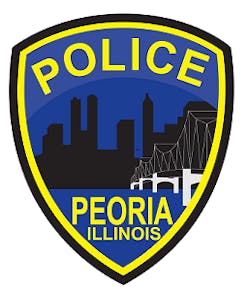Ill. Police Chief: 'Two Distinct Groups' at War in City
A surge in violence across Peoria is not due to gang violence, police Chief Eric Echevarria said Monday, but rather what appears to be "two distinct groups" at war within the city.
Those "groups," which he did not identify during a news conference at police headquarters, lack the characteristics of typical gang activity, Echevarria said.
"There is normally a structure in a gang, there is somebody that's a leader and then there is rules, policies and procedures in a gang. You'll find a manifest that tells you who's who, who's on top and who's at the bottom," he said. "I have yet to see that list or see those kind of rules here in the city of Peoria."
Why the two factions are fighting is unknown, the chief said.
"Nobody has been able to answer to me where this originated, why there is two groups, if you will, or two areas that are at war in the city," Echevarria said. "Nobody can pinpoint with me where this all started, how'd we get here."
He said it appears to be an ongoing feud.
With 24 homicides already recorded in the city this year, Echevarria met with clergy from across Peoria on Monday and said he hopes to engage women in the impacted neighborhoods to prevent more violence.
This problem did not start overnight and it will not end overnight, Echevarria warned after meeting with clergy from dozens of churches in Peoria, something he says he plans on doing monthly. He said he'll be listening to their ideas for how to curb violence and to spread the message that the police are going to help the community.
A community fest or day of prayer were among the ideas that came from the meeting and struck Echevarria as potentially being useful in stopping violence.
"Whatever it is they do, however they pray, however they decide to do the things they do spiritually, but for all of them to get together and do that on a single day ... I love that there is unity amongst people in the city," Echevarria said.
Echevarria said he'd like to reach congregations throughout the city.
"If we can tap into all these congregations and get our message across that we need a cease-fire, that we need peace, that we want a safe community, that the police is there to help and we are ready to get on board and push whatever we need to do to work collectively with our community, that's what I want to do," Echevarria said.
Echevarria said holding meetings of women, mothers, grandmothers and others from Peoria's communities affected by violence is key to getting to the root of the problem and preventing more bloodshed.
But he said it's not likely to be easy to gather people together, and that emotions are likely to run high.
"We're going to have people across the table that their families haven't seen eye to eye or something has happened for somebody else from another group and somebody else from another group has had an issue with somebody," Echevarria said. "But at some point we have to put a stop to this."
Being able to "tap into the power of the woman" is critical to quelling the violence, Echevarria said, because he believes they have a lot of influence over the "children and men" committing violence.
In partnership with trauma officials at OSF HealthCare Saint Francis Medical Center, a women's meeting on violence will be held Oct. 22 at OSF.
"We are going to have a meeting, we want to talk to the ladies involved in the lives of any victim that we've had," Echevarria said. "They keep our home together. The women are holding the fort down at the houses ... they're trying to do the best they can to maintain a family."
However, those efforts won't be a "magic pill" to ending violence, Echevarria cautioned.
"It's going to take time, it's going to take work, it's going to take effort, there is going to be emotions involved, but we have to start somewhere," Echevarria said.
___
(c)2021 the Journal Star (Peoria, Ill.)
Visit the Journal Star (Peoria, Ill.) at www.PJStar.com
Distributed by Tribune Content Agency, LLC.
